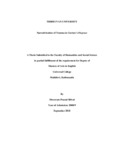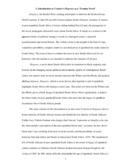Please use this identifier to cite or link to this item:
https://elibrary.tucl.edu.np/handle/123456789/829| Title: | Narrativization of Trauma in Coetzee’s Disgrace |
| Authors: | Silwal, Shreeram Prasad |
| Keywords: | Literature;Generation |
| Issue Date: | 2011 |
| Publisher: | Faculty of English |
| Level: | Masters |
| Abstract: | J.M. Coetzee’s Disgrace depicts legacy of apartheid as a cause of communal violence in post-apartheid South Africa. However, Coetzee, by narrativizing post-apartheid South African trauma attempts to reduce the intensity of trauma of South Africans and in the same way attempts to build the lost identity of the blacks. He, in order to shatter stereotypical understanding of people about blacks, shows gradual social and economic progress of the blacks. Similarly, he also presents the possibility of forgiveness in new South Africa which is must to establish peace and harmony between the whites and the blacks. The positive attitude of newer generation whites towards blacks marks the possibility of racial reconciliation between the whites and the blacks. Lucy, after being inhumanly raped by blacks totally forgives the black rapists unconditionally and such ethical act of newer generation people gives hope that peace and harmony will be established in the country. In the same way, the novel also offers the difficulties confronted by whites with racist attitude. The disgrace of fallen whites like Lurie, who still have problematic attitude towards the blacks shows people like him are getting a kind of the ethical obligation in post apartheid South Africa in order to transform themselves to adjust to the pace of the country. |
| URI: | http://elibrary.tucl.edu.np/handle/123456789/829 |
| Appears in Collections: | English |
Files in This Item:
| File | Description | Size | Format | |
|---|---|---|---|---|
| Cover.pdf | 15.58 kB | Adobe PDF |  View/Open | |
| Chapter.pdf | 217.95 kB | Adobe PDF |  View/Open |
Items in DSpace are protected by copyright, with all rights reserved, unless otherwise indicated.
